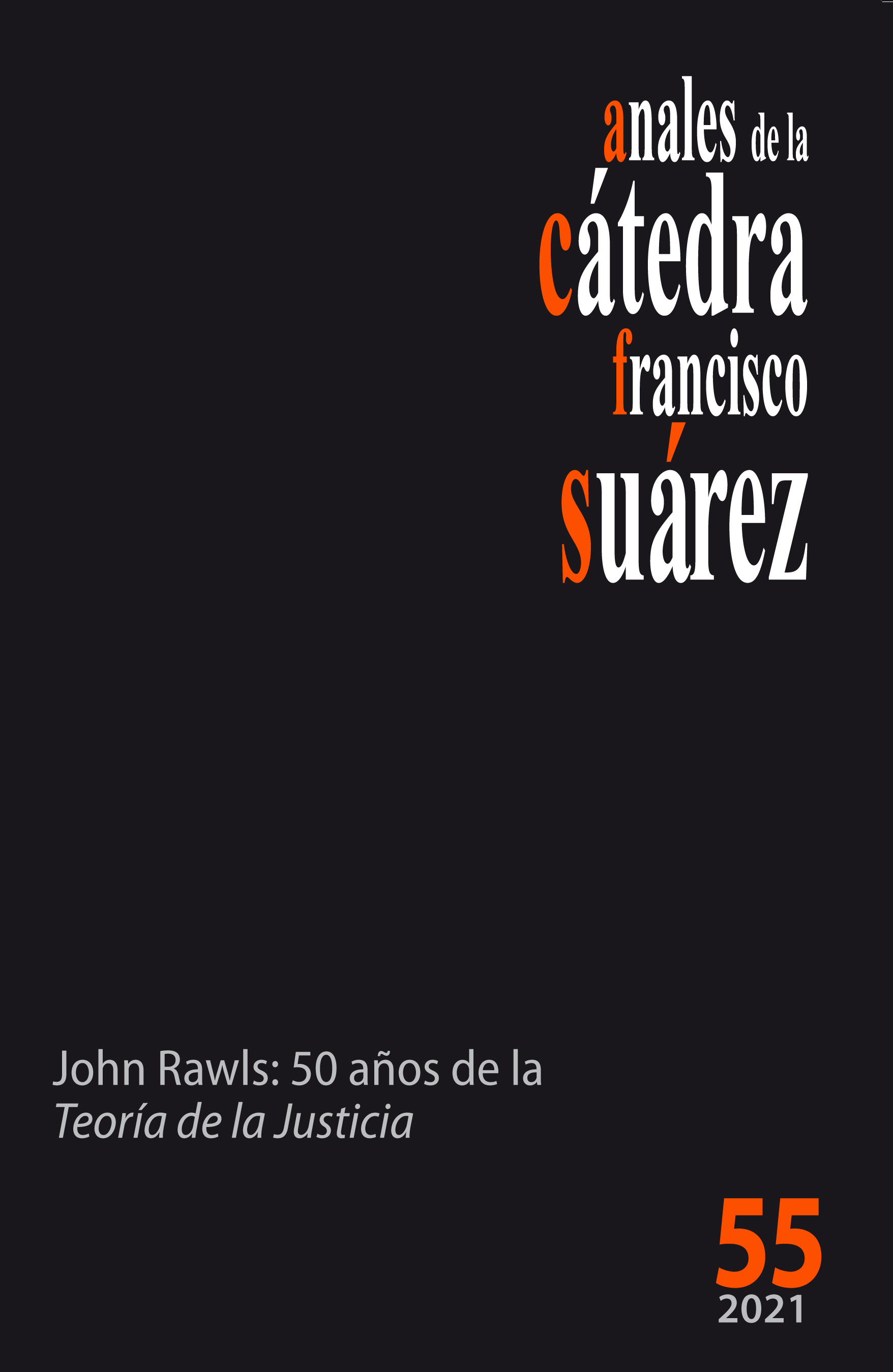La explotación laboral en los países en desarrollo ¿Un mal menor? El debate en torno a las sweatshops
DOI:
https://doi.org/10.30827/acfs.v55i0.15718Abstract
Millones de personas en el mundo no disponen de otra alternativa para huir de la pobreza más extrema que trabajar en condiciones de explotación en una sweatshop. A través de la non worseness-claim y el argumento de la elección, Powell y Zwolinski sostienen que, aunque dicha explotación sea moralmente problemática, proporciona beneficios a dichas personas que impediría considerarla gravemente injusta y justificar así la prohibición o regulación de las sweatshops. En este trabajo se analizan las claves de este discurso, así como los principales intentos de rebatirlo basados en la idea de que dichas fábricas se aprovechan de injusticias de trasfondo de las que los empresarios son, de algún modo, responsables. El éxito de este argumento exige asignar a los empresarios responsabilidades distributivas adicionales a las generales que resulta, sin embargo, cuestionable. De ahí que, en la parte final del trabajo, ofrezca algunas razones alternativas para considerar que la explotación en las sweatshops es una injusticia grave que justifica su regulación.Downloads
References
Arnold, D. & Bowie, N. (2003). Sweatshops and Respect for Persons. Business Ethics Quarter-ly, 13 (2), 221-242.
Barnes, M. (2013). Exploitation as a Path to Development: Sweatshop Labour, Micro-Unfairness, and the Non-Worseness Claim. Ethics & Economics, 10 (1), 28-43.
Bayón, J. C. (1986). Los deberes positivos generales y la determinación de sus límites. Doxa. Cuadernos de Filosofía del Derecho, 3, 35-54.
Berkey, B. (2019). Sweatshops, Structural Injustice, and the Wrong of Exploitation: Why Multinational Corporations Have Positive Duties to the Global Poor. Journal of Business Eth-ics. https://doi.org/10.1007/s10551-019-04299-1.
De Miguel, I. (2016). Por la erradicación de la pobreza global. No más sweatshops. Anuario de Filosofía del Derecho, XXXII, 85-118.
Dworkin, G. (1972). Paternalism. The Monist, 56 (1), 64-84.
Fabre, C. (2006). Whose Body is it Anyway? Justice and the Integrity of the Person. Oxford: Clarendon Press.
Faraci, D. (2019). Wage Exploitation and the Nonworseness Claim: Allowing the Wrong, To Do More Good. Business Ethics Quarterly, 29 (2), 169-188. https://doi.org/10.1017/beq.2018.28.
Flanigan, J. (2018). Sweatshop Regulation and Workers’ Choices. Journal of Business Ethics, 153, 79–94. https://doi.org/10.1007/s10551-016-3395-0.
Gabriel, I. (2017). Effective Altruism and its Critics. Journal of Applied Philosophy, 34 (4): 457-473. doi: 10.1111/japp.12176.
García Manrique, R. (2019). Venta de órganos y desigualdad social. Doxa. Cuadernos de Filosofía del Derecho, 42: 309-332. https://doi.org/10.14198/DOXA2019.42.13.
Goodin, R. (1988). Exploitation. En Goodin, R., Reasons for Welfare. The Political Theory of the Welfare State (123-152), Princeton: Princeton University Press.
Ip, K. (2016). Egalitarianism and Global Justice. From a Relational Perspective, N. York: Pal-grave Macmillan.
Kates, M. (2015). The Ethics of Sweatshops and the Limits of Choice. Business Ethics Quar-terly 25 (2), 191-212. doi: 10.1017/beq.2015.9.
Kates, M. (2019). Sweatshops, Exploitation, and the Case for a Fair Wage. The Journal of Po-litical Philosophy, 27 (1), 26-47. doi: 10.1111/jopp.12155
Kuyumcuoglu, H. (2019). Sweatshops, Harm, and Interference: A Contractualist Approach. Journal of Business Ethics, https://doi.org/10.1007/s10551-019-04302-9.
Lomasky, L. & Teson, F. (2015). Justice at distance. Extending freedom globally. Cambridge: Cambridge University Press.
Malmqvist, E. (2015). Better to Exploit than to Neglect? International Clinical Research and the Non-Worseness Claim. Journal of Applied Philosophy: 1-15. doi: 10.1111/japp.12153.
Meyers, C. (2004). Wrongful beneficence: Exploitation and third world sweatshops. Journal of Social Philosophy, 35(3), 319–333.
Mill, J.S. (2001) [1848]. Principles of Political Economy, Ontario: Batoche Books.
Neu, M. (2018). Just Liberal Violence: Sweatshops, Torture, War. Rowman & Littlefield Pub-lishers.
Nozick, R. (2018). Anarquía, Estado y Utopía. N. Yok: Innisfree.
O´Neil, O. (2004). Bounds of Justice. Cambridge: Cambridge University Press.
Olsaretti, S. (2016). Voluntariness, Coercion, Self-ownership. En Schmidtz, D. y Pave, C. (eds), The Oxford Handbook of Freedom (439-455). Oxford: Oxford University Press.
Pogge, T. (2011). Are We violating the Human Rights of the World´s Poor? Yale Human Rights & Development, 14 (2), 1-33.
Powell, B. (2014). Out of poverty: Sweatshops in The Global Economy. Cambridge University Press, Cambridge.
Powell, B. & Zwolinski, M. (2012). The ethical and economic case against sweatshop labor: A critical assessment. Journal of Business Ethics, 107, 449-472. doi: 10.1007/s10551-011-1058-8.
Preiss, J. (2014). Global Labor Justice and the Limits of Economic Analysis. Business Ethics Quarterly, 24 (1), 55-83. doi: 10.5840/beq20141272.
Preiss, J. (2019). Freedom, Autonomy and Harm in Global Supply Chains. Journal of Business Ethics, 160, 881-891. https://doi.org/10.1007/s10551-018-3837-y.
Radin, M. (1987). Market-Inalienability. Harvard Law Review, 100 (8), 1849-1837.
Raz, J. (1986). The Morality of Freedom. Cambridge University Press.
Rivera, E. (2017). Explotación y bioética. Ética individual y regulación jurídica. Revista de Bioética y Derecho, 40, 7-22.
Sample, R. (2003). Exploitation: What It Is and Why It’s Wrong, Lanham: Rowman & Littlefield Publishers.
Sen, A. (2010). La idea de justicia. Madrid: Taurus.
Shapiro, I. (2016). Politics Against domination. Cambridge MA: The Belknap Press of Harvard University Press.
Sherrat, L. (2016). Can microfinance work? Oxford: Oxford University Press.
Snyder, J. (2008). Needs exploitation. Ethical Theory and Moral Practice, 11, 389-405. Doi: 10.1007/s10677-008-9115-9.
Snyder, J. (2010). Exploitation and Sweatshop Labor: Perspectives and Issues. Business Ethics Quarterly, 20 (2), 187-213.
Snyder, J. (2013). Exploitation and demanding choices. Politics, Philosophy & Economics, 12, 4, 345-360. Doi: 10.1177/1470594X13496067.
Valentini, L. (2011). Justice in a Globalized World: A Normative Framework. Oxford: Oxford University Press.
Wertheimer, A. (1999). Exploitation. Oxford: Oxford University Press.
Wertheimer, A. (2010). Rethinking the ethics of clinical research: widening the lens, N. York: Oxford University Press.
Wicks, E. (2016). The State and the Body. Legal Regulation of Bodily Autonomy, Oxford: Hart.
Wood, A. (1995). Explotation. Social Philosophy & Policy, 12 (2), 136-158.
Zwolinski, M. (2007). Sweatshops, Choice and Exploitation. Business Ethics Quarterly, 17n (4), 689-727.
Zwolinski, M. (2012). Structural Exploitation. Social Philosophy & Policy, 29 (1): 154-179. doi:10.1017/S026505251100015X.
Zwolinski, M. & Wertheimer, A. (2017). Exploitation. En Zalta, E. (ed.), The Stanford Ency-clopedia of Philosophy, Acceso abierto en https://plato.stanford.edu/archives/sum2017/entries/exploitation/.
Downloads
Additional Files
Published
How to Cite
Issue
Section
License
Authors are the owners of the rights to their works. ACFS requests that publication notice on ACFS is disclosed if they appear later in another place.

















